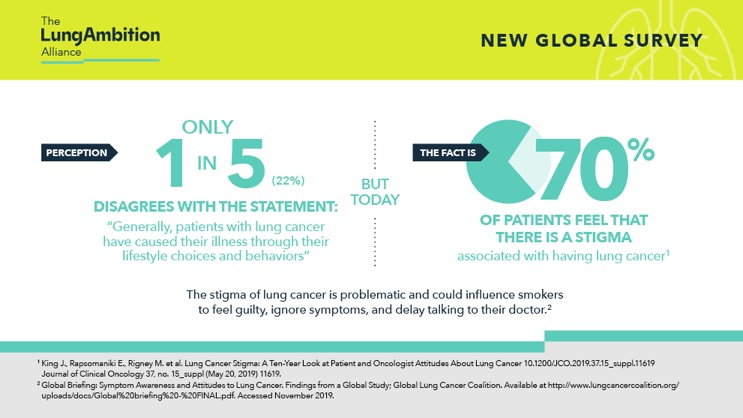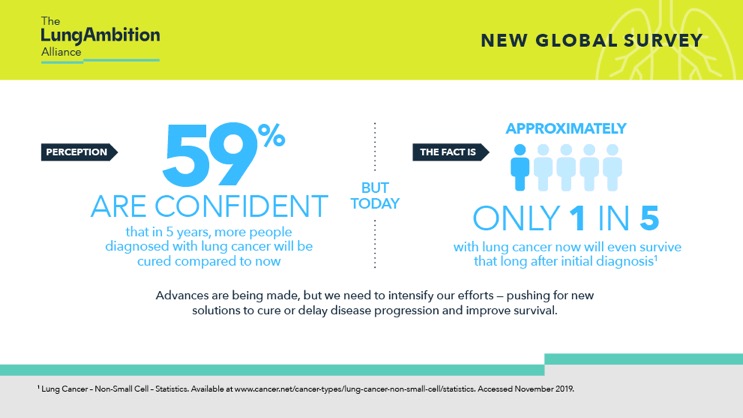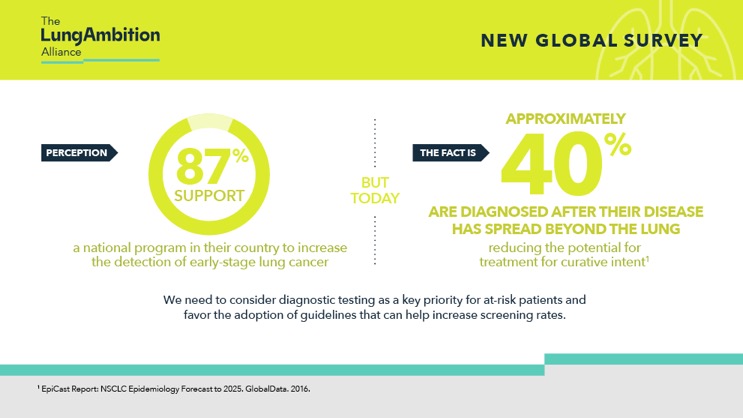LAA global survey reveals misconceptions about lung cancer

(LONDON, November 2019) – Only one in five people (22%) disagree with the statement “generally, patients with lung cancer have caused their illness through their lifestyle choices and behaviors,” according to a global, omnibus survey conducted by Ipsos MORI and sponsored by the Lung Ambition Alliance.
The results were released to coincide with the end of National Lung Cancer Awareness Month. Lung cancer is a disease still associated with stigma. The stigma of lung cancer is problematic and could influence smokers to feel guilty and delay talking to their doctor about potential symptoms.[1]

Additional results of the study show:
The majority of people (59%) are confident that in five years’ time a significantly higher proportion of those diagnosed with lung cancer will be cured compared to now.
- But the truth is that today, approximately only one in five people are alive five years after initial diagnosis[2]; despite recent progresses on the positive role of early detection and new treatments, there is still a long way to go to significantly improve survival.
Now is time to intensify the effort against lung cancer and push for new solutions that can delay disease progression.

Almost nine in 10 people (87%) are in favor of implementing a national program in their country to increase the detection of lung cancer in the early stages. Among them, nearly two in three (62%) declared that they are “strongly” in favor of it.
- But the truth is, globally, many countries have not yet adopted lung cancer screening despite evidence suggesting that lung cancer screening saves lives.[3],[4],[5] 40 percent of people are diagnosed after their disease has spread beyond the lung, reducing the potential for treatment with curative intent.[6]
- Now is time to consider diagnostic testing as a key priority for those at risk of lung cancer and favor the adoption of guidelines that can help increase screening rates.
Patrick Connor, VP and Global Franchise Head, Tumour Drivers and Resistance Mechanisms, AstraZeneca, said: “It is clear that we have made significant progress in lung cancer, however we know that there is still so much we can do to improve outcomes for this terrible disease. The results of the survey suggest that people around the world expect that we can do more for people with lung cancer by focusing on screening and early diagnosis, continued development of innovative treatments and improving the quality of patient care. The time to act is now.”
Jesme Fox, Secretary of the GLCC, said “It is important to understand the general public’s perception of lung cancer. These survey results are encouraging, in that that the majority are both optimistic about better future survival for lung cancer patients and also, in favor of implementing lung cancer screening. However, there is much to do to reduce the stigma and negativity surrounding this disease.”
Every 18 seconds, a life is lost to lung cancer.[7] In 2018 alone, approximately 1.8 million people died from the disease.7 Approximately 40 percent of patients are diagnosed when the cancer has already spread beyond the lung and their prognosis has worsened.6
About the Lung Ambition Alliance IPSOS MORI Survey
On behalf of the Lung Ambition Alliance, Ipsos MORI interviewed 7,000 adults aged 18 and over across seven countries (France, Germany, Italy, Japan, Spain, UK and US). Interviews were conducted online between 22nd October and 4th November 2019. Respondents from an online panel have been selected using statistical sampling following adjustments to criteria on gender, age, socio-professional category, geographical area and type of city based on census data available in each country for the population aged 18 and over. Results for each country have been weighted (Rim Weighting method) to reflect the population size of people aged 18 years and above to ensure sample is nationally representative within each market. Results have been also weighted to ensure that each country has the same weight when aggregated. For more information about the survey, please visit https://www.ipsos.com/ipsos-mori/en-uk/attitudes-and-awareness-lung-cancer-lung-ambition-alliance.
References
[1] Global Lung Cancer Coalition. Global Briefing: Symptom Awareness and Attitudes to Lung Cancer. Findings from a Global Study. Available at https://www.lungcancercoalition.org/uploads/docs/Global%20briefing%20-%20FINAL.pdf. Accessed November 2019.
[2] Cancer.Net. Lung Cancer – Non-Small Cell – Statistics. Available at www.cancer.net/cancer-types/lung-cancer-non-small-cell/statistics. Accessed November 2019.
[3] Piana R. Although Evidence Is Clear That Lung Cancer Screening Saves Lives, Adoption Rates Remain Low. ASCO Post. Available at https://ascopost.com/issues/march-10-2019/lung-cancer-screening-evidence-and-adoption/. Accessed November 2019.
[4] Yousaf-Khan U, et al. Final Screening Round of the NELSON Lung Cancer Screening Trial: The Effect of a 2.5-year Screening Interval. Thorax. 2017;72:48–56.
[5] The National Lung Screening Trial Research Team. Reduced Lung-cancer Mortality with Low-dose Computed Tomographic Screening. N Engl J Med. 2011;365(5):395–409.
[6] EpiCast Report: NSCLC Epidemiology Forecast to 2025. GlobalData. 2016.
[7] World Health Organization. International Agency for Research on Cancer. Fact Sheet – Lung Cancer. Available at http://gco.iarc.fr/today/data/factsheets/cancers/15-Lung-fact-sheet.pdf. Accessed November 2019.


